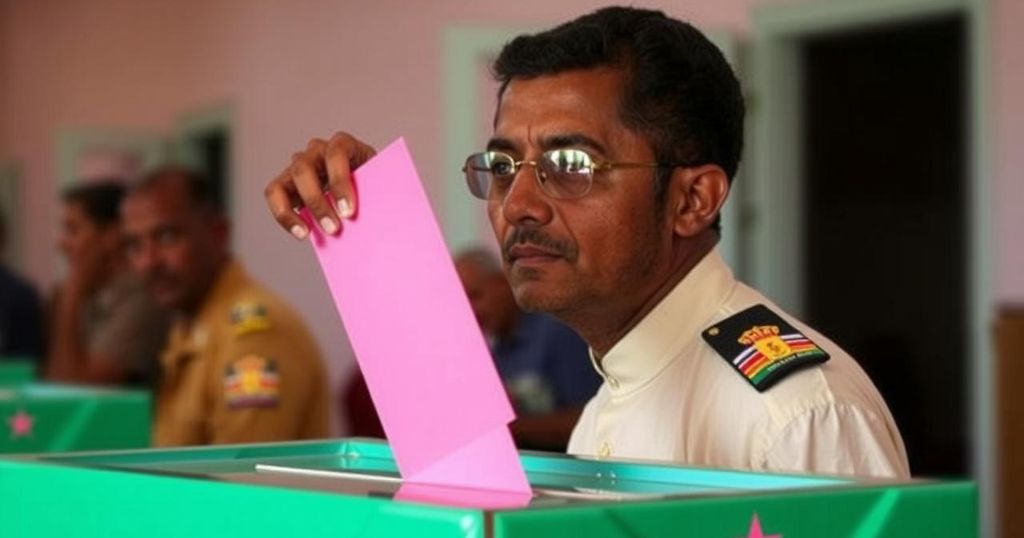Chad Holds Parliamentary Election Amid Opposition Boycott as Military Rule Ends
Chadians voted in parliamentary elections on Sunday, marking the end of three years of military rule. Despite the significance of this event, the main opposition parties boycotted the elections, citing a lack of credibility and calling it a mere facade for the incumbent leader’s regime. This election represents the first major democratic exercise in Chad in over a decade, with significant implications for its political future.
Chadians participated in parliamentary and regional elections on Sunday, heralding an end to a three-year transitional military rule. However, a significant number of opposition parties chose to boycott the elections, alleging that the electoral process lacked credibility. This election marks the first parliamentary contest in over a decade since the military leader, Mahamat Idriss Deby, assumed power following his father’s death in 2021. Despite calls for democratic reforms, many opposition figures described this electoral exercise as a mere façade to enable Deby’s continued governance.
This parliamentary election is particularly striking as it represents the first major move towards restoring democracy in Chad since the nation gained independence from France in 1960. With at least eight million voters registered to elect 188 legislators to the new National Assembly, its significance is compounded by the ongoing political turbulence in the region. The electoral landscape has been marred by disputes surrounding Deby’s earlier presidential victory, which observers largely deemed flawed. The opposition has called this election a “charade,” aimed at establishing a dynasty under Deby’s regime.
Included in the opposition boycott is the Transformers party, whose candidate, Succes Masra, criticized the electoral process vehemently. Masra and others have urged citizens to abstain from voting, claiming, “It is better to stay at home.” Moreover, a political coalition referred to as the Group of the Cooperation of Political Actors characterized participation as endorsing a fraudulent regime. Political analysts have expressed concern regarding the implications of this election for Chad’s democratic aspirations, emphasizing the critical nature of the current transitional phase.
This electoral milestone is set against a backdrop of escalating security challenges in Chad, including militant attacks from Boko Haram and strained military ties with France. As the nation strives to transition fully to a representative democracy, the absence of robust opposition remains a pivotal issue preventing meaningful political engagement. Political scientist Mahamat Oumar Adam remarked on the stakes involved, emphasizing that the successful conclusion of the transition depends on inclusive governance rather than exclusionary practices.
Chad’s elections have underscored broader themes regarding the quest for democracy in Africa, where military regimes have historically impeded political freedoms. The anticipation of results within two weeks will be critical in determining the country’s path forward and will reflect the electorate’s sentiments amidst a contentious political landscape.
Chad has faced a turbulent political history characterized by military rule and limited democratic governance since its independence from France in 1960. The recent military-led transition has raised questions regarding the legitimacy of its electoral processes and the potential for establishing a stable, democratic government. The electoral cycle initiated following the death of longtime president Idriss Deby Itno has seen significant opposition criticism, grappling with allegations of electoral fraud and power consolidation under his son, Mahamat Idriss Deby, who has sought to navigate the nation back towards democracy amidst various socio-political challenges.
The parliamentary elections in Chad signify a crucial juncture in the quest for democratic governance; however, the overwhelming boycott by opposition parties raises serious questions about the legitimacy of the electoral process. As the nation awaits the election results, the internal and external challenges to Chad’s stability remain a focal point in determining its political future. The struggles between military rule and democratic aspirations continue to shape the political landscape, highlighting the need for comprehensive reforms to ensure credible governance.
Original Source: abcnews.go.com




Post Comment